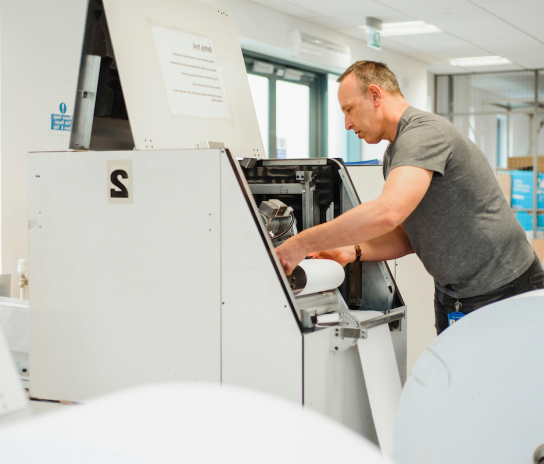Sharon’s professional background was in administration and customer services before beginning her career with Sight Scotland Veterans in 2011, initially as a transport assistant at the Linburn Centre.
Alongside assisting veterans with sight loss to the Linburn Centre and back home on the charity's transport, she began to provide some relief support work at the centre. Working with people with sight loss inspired her to pursue a career in social care, and she secured the role of Activity Support Worker at the Linburn Centre in 2017.

Could you tell us what's involved in your role?
"As an activity support worker, I am primarily responsible for supporting and leading in activities for veterans with sight loss at the Linburn Centre.
“While working as a transport assistant and in relief support, I really enjoyed helping and spending more time with the members and soon realised the meaningful work and difference the organisation made to a person with a visual impairment. I found the work exciting and challenging as I hadn’t done social care work before, so that was the turning point for me.
“As an activity support worker, I lead or support in gentle exercises, dance sessions, quizzes and discussion groups and arts and crafts sessions. I support in the woodwork sessions and the skills kitchen. I also support members on a one-to-one basis and organise and support outings as well.
“I have a background in ballroom and Latin American dancing, and so the dance classes for the members are something I’ve been able to bring to the centre.
“Some of my other daily tasks include environmental checks around the centre, assisting in transport, serving lunch and assisting members on a one-to-one basis with eating, drinking and personal care.”
What’s a shift at the Linburn Centre like?
“There are two different shifts for support workers at the centre. To give an idea of everything that we cover, we would normally start with environmental checks around the centre or helping pick up members to bring them to the centre on the transport.
“I assist with morning teas and coffees and chat to the members before morning activities. I’ll then either support or lead in a morning activity, then serve lunch or assist with eating and drinking when supporting members on a one-to-one basis. In the afternoon, I’ll support or lead in another activity, then assist with afternoon teas and coffees and chat to members before they leave. I’ll give personal care whenever required. Finally I’ll make notes recording any one-to-one sessions and prep for any upcoming activities. The time flies, it feels like a very quick day!”
What kind of training and development opportunities are there?
"While working as a transport assistant and in relief support, I obtained my SVQ3 in Social Services and Health Care, which was necessary for me to obtain the Assistant Support Worker role.
“There are always opportunities to undertake training courses. In supervision and appraisals I’m always asked if there’s any training I’d like to do. Since joining Sight Scotland Veterans, I’ve taken courses in health and safety, fire awareness, manual load handling, food and hygiene, GDPR, adult support protection and dementia awareness. It’s definitely given me more confidence, knowledge and skills. Next I’ll be looking at further training to lead in strength and fitness classes at the centre.
“The staff’s wellbeing is looked after and it’s a supportive, professional work environment where teamwork and ongoing personal development is promoted."
What's life like at the Linburn Centre?
“The team I work with are like a second family. There’s a good feeling of togetherness and trust and we all learn from each other. There’s also a lot of humour within our team morale and we’ve all got the same goal to keep the members at the forefront of everything we do.
“We’ve got a really good support network. The staff’s wellbeing is looked after and it’s a supportive, professional work environment where teamwork and ongoing personal development is promoted.
“For me, what’s challenging in this profession is that you build up relationships with the people you work with, so it’s difficult when you see their health decline or they pass away.”
What do you enjoy most about the role?
"I love being able to support people with a range of different needs to do different things. I really enjoy being attentive to members’ individual needs and abilities and offering them support and encouragement to remain independent. When you witness a person growing in confidence and achieving their goals, it’s a great feeling of accomplishment. Seeing the smile on someone’s face when they achieve something – to me, that’s so rewarding. I also enjoy listening to our members’ stories.
“I have fond memories of a member who had never had the chance to dance before. He had balance issues and used two canes for walking, but he took to dancing like a duck to water. It helped with his balance and it was evident as he walked around the dance floor unaided. He felt the more he danced, the more it improved his balance. Dancing was something I was able to share with him.”
What do you learn as an activity support worker?
“In this role you need honesty, compassion and empathy, and you need to be a good listener. You’ve got to have a cheery demeanour and willingness to learn. You’ll also use your own initiative to be adaptable and flexible because situations can change very quickly as you lead or support in an activity.”
You may also be interested in
Our Centres
Find out about our two activity hubs for veterans with sight loss: the Linburn Centre and the Hawkhead Centre.
About us
We've been around since 1915, and we’re here to offer support across Scotland for veterans of the Armed Forces who need us today.
